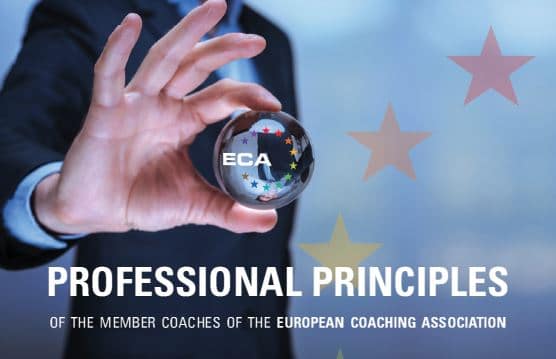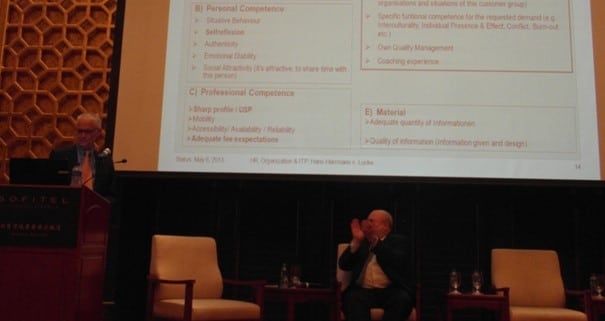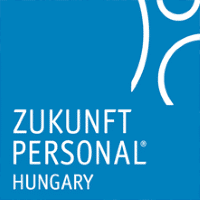Opportunities – Markets – Requirements
By Dr. Ludger Bruening.
The first Asian European Coaching Congress was held in Beijing (China) from May 6-7, 2013. The event was organized by the European Coaching Association (ECA) and supported by the German Chamber of Commerce (AHK) as a strategic partner. Sponsors included the European Chamber of Commerce and other national chambers of commerce. Thus, the promoter level showed already the increased current interest in coaching in China. The congress was made possible by the steady work of Dr. Konstantin Schamber, who serves currently as first ECA President China. He underlined the desired bridge function of the event by the theme he chose: Transformation across Frontiers – The Art of Leadership Development. 28 high-level speakers opened in this topic a diverse range of entrepreneurial and mental approaches and peculiarities in the work with and for foreigners and locals in multinational and Chinese companies. Among them were current or former high-ranked HR manager of international companies, coaches, and even philosophers and artists.
Delayed Introduction of HR development and coaching
HR development in the Western sense began in contrast to North America and Europe in China very late. For a long time, the communist party decided on the suitability of business leaders, which still happens in state-owned companies today. Ira Cohen, director of the Executive MBA program at the University of Maryland in China, explained, how he started together with others the first seminars for staff development in China at the University of Beijing in 1994. About 80 Chinese universities followed his example within the next 10 years, and a demand for coaching could be recognized finally in 2002. This was confirmed by Alan Babington-Smith, Director of Leadership Management International (LMI): „We came in 1997 and we came five years too early.“ Today, his company performs 2,000 coaching sessions per year and is the leading provider in this further education segment. In addition, the current directory Training Services in China, which is published by Universal Ideas Consultants, lists only 26 companies more under the category coaching, including the TÜV SÜD Academy as the only German one. Besides the great training and coaching institutes, there are also individuals offering coaching, either via the coaching pool of a large company or as an independent provider who maintains an office on site. While coaching is more or less known in Chinese enterprises by now, it is still far away from being the norm and life coaching as a private chance doesn’t play any role yet.
Panel discussion on leadership development and its impact on the performance of companies. From the left: Kitty Vorisek, Executive Vice-President, DHR International (Beijing), Dannie Tong, Vice-President of AGF Investment Group (Canada), Rens Metaal, Director for Asia at Thermaflex International Holding (Netherlands), Richard Wageman, a partner at DLA Piper (Beijing). Photos by Dr. Bruening.
Boom is expected in the near future
Despite the previous development, HR managers, department heads and coaches based in China agreed largely that a coaching boom is imminent. On one hand, a structural change is emerging. Chinese firms pursue a role change from supplier to independent global player, opening sites outside China, entering international co-operations, and acquiring companies in overseas. Those, who want to compete on multinational markets have to adjust to different standards and will benefit from a support to executives and increased staff development. Also, a change of generation and thus a change in the management culture is emerging, which facilitates the introduction of new methods. While the fathers generation got qualified by high school diplomas and showed a rather autocratic leadership understanding, their successors have studied at the university level to 90 percent, 60 percent even abroad, and thus gained a different background knowledge of management techniques. At the same time, the awareness of the importance of personality development has grown steadily.
Diffuse coaching concept and exaggerated expectations
However, that doesn’t mean that coaching is understood in a Western sense. The private companies which came to existence aside the state-owned enterprises during recent decades operate very cost-conscious and therefore expect a more or less immediate impact of coaching (return of investment). According to Helen Tian from Beijing Oneness International Coaching Studio, a clear distinction between mentoring, advising, consulting and coaching is frequently missing. The passing of knowledge and experience, advice, counseling, and help for self-help gets often mixed up under the name of coaching. Due to this generalized and unspecific understanding, clients are not sufficiently prepared for what awaits them in coaching, and coaches often see themselves confronted with expectations hard to accomplish. It is not uncommon, that Chinese clients expect answers, advice and instructions instead of questions. This is reflected by a report published in 2012 by Rainer B. Schmitz. The „Second Comprehensive Coaching Study in China”, completed on a very limited quantity basis and supported by the European Chamber of Commerce in China and the Asian Pacific Alliance of Coaches (APAC), points out, that about a third of the clients were unhappy with the coaching. On the other hand, Teresa Norton from Norton Associates (Hong Kong) underlined that to her experience Chinese clients tend to be much more adventurous than their Western fellows if they know what coaching is about in a narrower sense. In any case, it is important to avoid that someone loses face, and to prevent the impression that the coaching will be arranged due to deficits. Instead, it should be understood as a distinction, especially since coaching is a much larger company’s investment in the employee at first sight than other training opportunities.
Confidentiality is often lacking
However, confidentiality is not always guaranteed. Although international companies know, generally, what coaching is, the rule of „no secrets“ applies not only to Chinese companies fairly often. In 40 percent of the companies, the contracting entity wants to know everything and not just a rough frame and an object, according to the Comprehensive Coaching Study. Correspondingly, congress participants reported that it may take several sessions until a basis of trust is built with the client, and that sometimes, it is not easy to maintain the double loyalty to clients and customers.
Although the classic coaching meeting will still take place in 67 percent of the cases, approximately one third of the sessions will be held by phone or Skype, at a mean total duration of four to six months. According to Paul Jensen, now CEO of Yi Ding Rui-Enterprise Consulting Company and previously for many years Head of Human Resources of Bombardier in China, the coach is usually taken as a fire fighter. He gets called to limit damage, not such much to develop the potential of the client in the first place.
Tao Deng, founding partner of Tops Star China and Head of Human Resources for Google Greater China, speaking on coaching differences in Chinese and international companies.
Potential development for job-hopper?
A systematic development of the potential of employees, as it is done by Volkswagen AG, the first foreign carmaker who got engaged in China in 1985, seems to be more the exception. This is mainly due to the high labor turnover rate in China. To have held many posts in a short time, has a great prestige and job-hopping is rampant. A still booming economy creates almost unlimited opportunities. According to „China in 2030“, a Chinese university study published immediately before the congress, China could replace the U.S. as the strongest global economic power in the coming years and reach twice the U.S. volume by 2030. Given the large infrastructural, environmental and social problems of the country, the beginning of the gradual withdrawal of state centralism and the increase of minimum wages initiated by the new government of the P.R. China, it remains to be seen to what extent this very optimistic forecast will occur. But there is no doubt to the fact that China’s economic growth will continue. Its rapid speed created almost unlimited possibilities for young managers, in recent years. According to the Second Coaching Study, the head of a business unit in China is generally 10 years younger than their Western counterparts, who have a comparable position: in China they are statistically about 38 years old, in the west 45 to 48 years old. While the Chinese reached their position in nearly half of the time, they worked during this time in five different locations, while their Western counterparts worked in two or three before they reached their position. The exchange frequency associated with the relatively steep careers constrains the inclination of many employers to finance extensive development programs. Coaching is a high investment and not anyone can get it, although it could often be helpful, straight because of the shorter work experience and the absence of role models in an economically liberalizing and globalizing China. This leads companies like VW exactly to the opposite approach. Hans-Hermann von Lucke, who is organizing currently a coaching pool for the Volkswagen Group in China, pointed out: „How can we keep the high performer on board? By treating him or her as a high potential. Of course, it may be, that they switch to a competitor anyway. But maybe, they also come back in a few years.“
Paul Jensen, formerly Bombardier applauds Hans-Hermann von Lucke in his presentation on the Coach requirements of VW.
Frustration tolerance and a long breath
In this context Paul Jensen stressed: „Every company has its own culture.“ In the light of the country’s size and its high internal dynamic, the entry in the market is not easy for foreign coaches. Those who want to get involved professionally in China should, in addition to cross-cultural knowledge, bring a greater frustration tolerance, patience and self-confidence. Coaching goals, the understanding of methods and ethics can vary greatly and the trust of the customer needs to grow first. This applies particularly to the Chinese contracting entities, which – if at all – at first often rely on Chinese coaches who get a lower fee. Ira Cohen, who also serves as Vice President of Universal Ideas Consultants, emphasized that it is important to note that Chinese companies are largely characterized by an „autocratic consensus“. According to Rens Metaal, Asia director at the Dutch Thermaflex International Holding, issues get discussed for a very long time, until an agreement is reached. However, the direction is determined by the leader, Ira Cohen stressed: „It comes to a consensus, but he has to make the decision alone.“ To ask questions, this is both internally and socially, not common yet. It has therefore also a political dimension. The editor of the Directory Training Services gave to consider this: „Curiosity is the prerequisite for innovation. But if you open Pandora’s box, it remains not limited to scientific or technical questions. And China is not ready for a questioning society at this time. „
Be on the spot with a clear profile
For those who want to work as a coach in China, local residence or presence is almost indispensable. This also applies, if you are seeking access to the coaching market by acceptance in coaching pools of international companies. „Only for top executives, only for the highest levels of management, coaches might be flown in,“ Helen Tian underlined. As well, a near-native proficiency in English is almost essential, and knowledge of Chinese is of great advantage. Marianne Friese from MF Consulting, who has offices in Berlin, Beijing and Shanghai, recommends in principle companies that want to be active in China, to choose a Chinese name and to publish brochures in Chinese, too. „This is seen as an expression of commitment and dedication.“ In order to be admitted to pools of international companies such as VW, a clear coaching profile stating the thematic focal points may be necessary.
No fear of competition
The local competition is strongly influenced by the business sector, which is in fact the only client. Consequently, the broad methodological knowledge which is more typical for the field of personality development cannot be expected even with colleagues who are well established and resident in the country. The dominant coaching association in China is the International Coach Federation (ICF), which got founded originally in the U.S. According to Helen Tian, integrative coaching educations of 16 to 21 days length are offered in the name of the association. Methodological alternatives such as working with the logical levels (NLP), the miracle question (solution-focused short-term coaching), the questions of Byron Katie (The Work) or constellation work with representatives or figures (system dialog) were discussed with great interest. In particular, wingwave demonstrations by Cora Besser-Siegmund were followed closely.
Most European congress participants had personal connecting factors
The motivation of those congress participants, who have not yet established themselves as coach or resident in China, was different. Many had also personal starting points, so that in addition to the interest in the exchange of ideas often existed a dedicated interest to be professionally active here in one way or another. The range of prior experience was great. For example, Cora Besser-Siegmund wears a ring of her grandparents, given to them in the 1920s in Hamburg (Germany) by fellow Chinese trading partners, and her daughter Lola had been invited to China by a Chinese schoolmate already at the age of 12. Manuel Goße, who offers conflict management and mediation today, was already several times in China during his activities for disabled people. Others took language courses, studied or took training in China.
A continuation is planned for next year
The European Coaching Association (ECA) has broken new ground with the congress in several respects, and received a very positive feedback from the mostly very high ranking congress participants. Hans-Hermann von Lucke emphasized, „I came out of duty and would certainly have driven back, if there would have been nothing new here. I did not expect such breadth and depth.“ Given the growth in interest in personality development in China, the expected substantial rise in demand for coaching, and the strongly consenting feedback of participants, a continuation of the congress is planned for next year in China’s economic hub Shanghai.
About the author:
Dr. Ludger Bruening is a management trainer, business coach and lecturer for coaching at the Department of Police at the University of Applied Sciences for Public Administration in Meiningen (Thuringia/Germany). He works since 1987 in adult education, since 2002 as a trainer and coach for professionals and executives. He is a licensed Coach Trainer (Lehrcoach), Intercultural and Management Executive Coach (ECA) as well as a certified NLP Trainer (Lehrtrainer) and Master Coach (DVNLP). Currently, he serves as a Vice President of the European Coaching Association (ECA) and as Vice Delegate of the German Association of NLP (DVNLP) to the European Associaton of NLP (EANLP). He is working in English or German, depending on the needs of his clients. Special focal points of his work are leadership and team issues, tough situations / conversations, self-confidence, (re-)orientation, vision building, empowerment, stress management, work-life balance, and intercultural competence. www.bruening-training.de.








